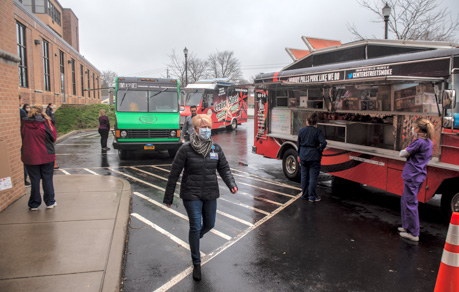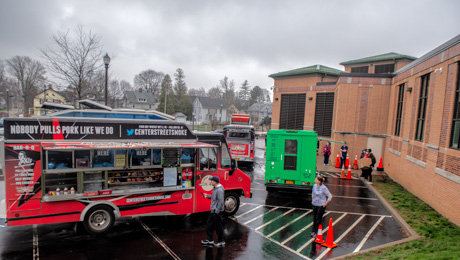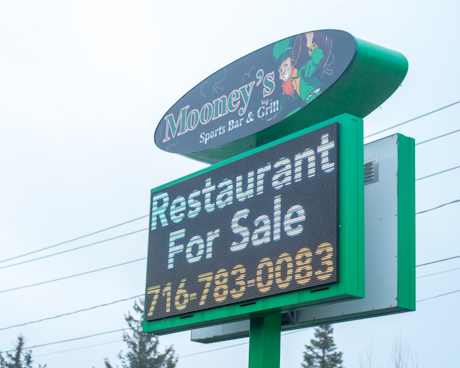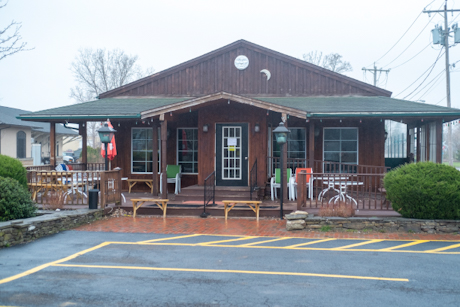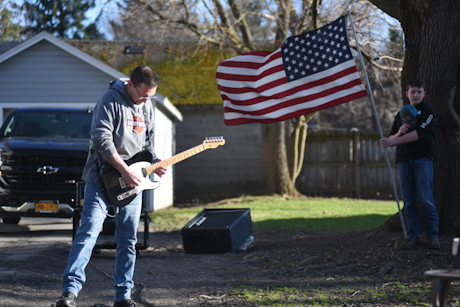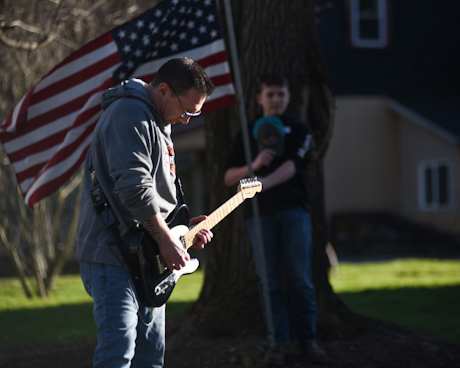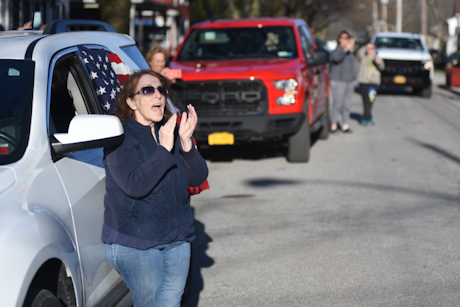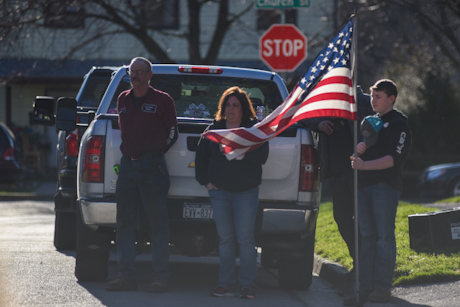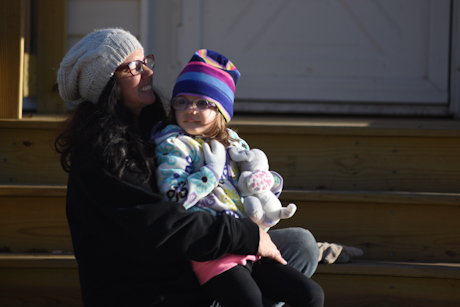Governor Andrew M. Cuomo today announced highlights of the FY2021 Enacted Budget, which advances the Governor's Making Progress Happen agenda. The budget is balanced, includes no new taxes, continues to phase in tax cuts for the middle class, enacts the strongest Paid Sick Leave program in the nation, and advances other progressive priorities including the legalization of gestational surrogacy.
The Budget also enacts the "Josef Neumann Hate Crimes Domestic Terrorism Act" — named in memory of the Monsey stabbing victim who passed away this past Monday — defining hate-fueled murder with the intent to cause mass casualties as an act of domestic terrorism with penalties equivalent to other acts of terrorism.
The Budget closes a loophole to prohibit individuals who commit serious offenses in other states from obtaining a gun license in New York. It also allows judges to ban high-risk sexual offenders and those who assault MTA employees from accessing the MTA subway, bus and rail systems.
The Budget promotes public health by banning the sale of flavored e-cigarettes and capping insulin co-payments at $100 per month.
The Budget also prohibits gender-based pricing discrimination by eliminating the "pink tax."
The enacted budget will also permanently ban hydrofracking in state law to ensure we protect our natural resources.
The budget also authorizes a reduction in spending by $10 billion to account for the economic impact of the COVID-19 pandemic.
"This is a moment in history unlike any other, and government needs to function and deliver results for the people of this state now more than ever — and that's exactly what we did with this budget," Governor Cuomo said. "That the legislature and the Executive got this budget done with all of these policy initiatives is an extraordinary feat, and I praise Speaker Heastie, Leader Stewart-Cousins and every member of the legislature.
"It would have been very easy to say, 'Oh, this is an extraordinary year; let's just do the bare minimum and go home.' We did the opposite. We said there is a lot of need and there are a lot of issues that need to be addressed, and we stepped up to the plate and we got it done. That it was done this year is really extraordinary."
2021 MAKING PROGRESS HAPPEN ENACTED BUDGET HIGHLIGHTS
Establishing Paid Sick Leave for Working New Yorkers: To further empower New York's workers and protect all consumers in the State, the FY 2021 Enacted Budget enacts a paid sick leave program for working New Yorkers. Businesses with five to 99 employees will provide their employees at least five days of job-protected paid sick leave per year and businesses with 100 employees or more will provide at least seven days of paid sick leave per year. Smaller businesses, with four or fewer employees, will guarantee five days of job-protected unpaid sick leave to their employees every year. Small businesses already providing paid sick leave will be able to so.
Legalizing Gestational Surrogacy in New York State: The FY 2021 Enacted Budget legalizes gestational surrogacy in New York State once and for all, helping LGBTQ couples and couples struggling with infertility. The legislation will also establish criteria for surrogacy contracts that provide the strongest protections in the nation for parents and surrogates, ensuring all parties provide informed consent at every step of the process, and will create a Surrogates' Bill of Rights, which would ensure the unfettered right of surrogates to make their own healthcare decisions, including whether to terminate or continue a pregnancy and that surrogates have access to comprehensive health insurance and independent legal counsel of their choosing, all paid for by the intended parents. The legislation included in the Budget will also create a streamlined process for establishing parenthood when one of the individuals is a non-biological parent, a process known as "second-parent adoption."
Passing the "New York Hate Crime Anti-Terrorism Act": The FY 20201 Budget establishes a "domestic act of terrorism motivated by hate" crime as a new A-1 class felony punishable by up to life in prison without parole.
Closing the Out-of-State Gun Loophole: The FY 2021 Enacted Budget includes legislation to prohibit individuals from obtaining a gun license who commit serious offenses out-of-state that would disqualify them from obtaining a gun license if committed in New York. This will provide greater consistency in New York's licensing scheme and ensure individuals who are prohibited from purchasing a firearm are not able to do so. The Enacted Budget also includes legislation to require all state and local law enforcement agencies in the state to opt in to the ATF's crime gun trace data sharing program and submit crime guns recovered through the ATF's eTrace system. Additionally, the Enacted Budget includes legislation to amend the Mental Hygiene Law to allow New York to share reports of individuals who are a danger to themselves or others with other states.
Housing and Services for People who are Homeless, Including Those with Mental Illness: New York's homeless community and those with mental illness are among the hardest populations to help. The FY 2021 Enacted Budget includes an aggressive strategy and additional support to provide housing and services to these vulnerable populations.
Enact a Comprehensive Tobacco Control Policy. Governor Cuomo has taken unprecedented steps to ensure the health and safety of all New Yorkers by combatting the use of harmful tobacco and nicotine products. The Enacted Budget prohibits the sale or distribution of e-cigarettes or vapor products that have a characterizing flavor unless approved as part of an FDA pre-market approval; prohibits the sale of tobacco products, including e-cigarettes, in all pharmacies; restricts the delivery of e-liquid products only to NYS-licensed vapor retailers; restricts the public display of tobacco and vapor products near schools; requires manufacturers of vapor products to disclose to the DOH Commissioner and the public, information regarding the ingredients, by-products, or contaminants in vapor products, whether intentional or unintentionally added; bans certain carrier oils if they are determined to be harmful; bans coupons and manufacturer discounts and displays in shops; and increases penalties for illegally selling tobacco products to minors.
Prescription Drugs: The FY 2021 Enacted Budget includes a three-part plan to lower prescription drug costs for all New Yorkers. The Budget caps insulin co-payments at $100 per month for insured patients to help address the rising cost of insulin that has resulted in diabetes patients rationing, skipping doses and not filling prescriptions. Finally, the Enacted Budget establishes a commission of experts to study the feasibility and benefits of a Canadian drug importation program and submit a plan to the U.S. Department of Health and Human Services for review.
Banning the "Pink Tax":The FY 2021 Enacted Budget prohibits gender-based pricing discrimination for substantially similar or like kind goods and services. The legislation would require certain service providers to provide price lists for standard services upon request and notice that gender-based price discrimination is prohibited under state law. Businesses that violate the law would be subject to civil penalties.
Authorized the creation of a $3 Billion Restore Mother Nature Bond Act: The Budget authorizes the creation of a Bond Act to fund critical environmental restoration and climate mitigation projects in every corner of the state to ensure New York is able to adapt to the intensifying impacts of climate change, and reduce emissions, while creating jobs and local economic development. As part of the larger Restore Mother Nature Initiative, the Bond Act will be a key source of funding for projects focused on reducing flood risk, investing in resilient infrastructure, restoring freshwater and tidal wetlands, preserving open space, conserving forest areas, and reducing pollution from agricultural and storm water runoff. It will also fund up to $700 million in projects to fight climate change, including green buildings. It also aims to spend 35 percent of the funds on projects to benefit underserved areas of the state. The Budget Director will assess the state's finances and the economic outlook later this year and make a determination as to whether to move forward with the Bond Act.
Permanently Banning Hydrofracking: The Enacted Budget codifies Governor Cuomo's ban on the Department of Environmental Conservation approving permits that would authorize an applicant to drill, deepen, plug back or convert wells that use high-volume hydraulic fracturing as a means to complete or recomplete a well. In addition, it places a moratorium on future gelled propane hydrofracking applications until the Department can conduct an analysis of the impacts of this completion method. This will protect the health of New Yorkers and ensuring permanently that our environment is not harmed by this practice.
Continuing Middle-Class Tax Cuts: This year's Enacted Budget continues to lower Personal Income Tax rates for middle-class New Yorkers. In 2020, the third year of the multi-year tax cuts enacted in 2016, income tax rates have been lowered from 6.85 percent to 6.09 percent for taxpayers in the $43,000-$161,550 income bracket, and to 6.41 percent in the $161,550-$323,200 income bracket. These cuts are expected to save 4.7 million New Yorkers over $1.8 billion this year. Furthermore, income tax rates will continue to drop to 5.5 percent for taxpayers in the $27,900-$161,550 tax bracket and 6 percent in the $161,550-$323,200 bracket. When the cuts are fully phased in, middle class taxpayers will have received an income tax rate cut up to 20 percent, amounting to a projected $4.2 billion in annual savings for six million filers by 2025. As the new rates phase in, they will be the State's lowest middle-class tax rates in more than 70 years.
Increasing and Modernizing Emergency Response Capacity: Over 60 percent of New York counties have been flooded twice in the past 10 years. We must be ready to handle these increasing, life-threatening, emergency situations. It is a new and growing challenge for our state operations. The FY 2021 Enacted Budget sustains $12 million in capital funding to increase and update the State's emergency response capacity so our brave women and men have the right equipment to do their jobs.
Addressing Veteran and Law Enforcement Suicides: The FY 2021 Enacted Budget invests $1 million to partner with organizations to help veterans, law enforcement and first responders with suicide prevention efforts. The Budget also directs state agencies to expand suicide prevention strategies for veterans, law enforcement, correctional officers and first responders, including a new campaign by the Office of Mental Health to reduce the stigma of mental illness. Additionally, the State will convene a panel of stakeholders and experts at its annual Suicide Prevention Conference to develop and implement strategies for preventing suicide among these special populations.
Adding E Pluribus Unum to the State Coat of Arms: Our founding fathers said clearly that the idea of unity was the key to America's future. In 1782, on the first seal of the United States, they said it in three simple words - E pluribus unum, out of many one. This federal government and our nation seem to have forgotten that essential American principle. In this time of turmoil, New York State will remind the nation of who we are by adding E pluribus unum to the State's coat of arms as part of the FY 2021 Enacted Budget, proclaiming at this ugly time the simple truth that without unity we are nothing.
GREEN ECONOMY & ENVIRONMENT
Accelerating Renewable Energy Projects and Driving Economic Growth as Part of Nation-Leading Climate Agenda: The Enacted Budget includes the Accelerated Renewable Energy Growth and Community Benefit Act, which will dramatically speed up the permitting and construction of renewable energy projects, combat climate change and grow the state's green economy. The State will also accelerate renewable transmission delivery. The Act will create a new Office of Renewable Energy Permitting to improve and streamline the process for environmentally responsible and cost-effective siting of large-scale renewable energy projects across New York while delivering significant benefits to local communities. "Build Ready" sites will be pre-approved, permitted and auctioned to developers to prioritize the re-use of abandoned commercial sites, brownfields, landfills, former industrial sites, and otherwise underutilized sites. These actions will accelerate progress towards Governor Cuomo's nation-leading clean energy and climate goals - including the mandate to obtain 70 percent of the state's electricity from renewable sources - as identified under the state's Climate Leadership and Community Protection Act.
Banning the Distribution and Use of Styrofoam: The Enacted Budget prohibits the distribution and use of expanded polystyrene, commonly known as Styrofoam, single-use food containers. It also bans the sale of expanded polystyrene packaging materials known as packing peanuts. This is the strongest statewide ban in the United States and will go into effect by January 1, 2022.
Enacting Comprehensive E-Bike and E-Scooter Legislation: To get more people out of cars, the FY 2021 Enacted Budget includes comprehensive legislation to legalize and expand the e-bike and e-scooter network without compromising on public safety.
Green Economy Tax Credit: The budget creates a new refundable, discretionary Green Jobs Tax Credit totaling up to 7.5 percent of wages for each net new job created fostering the expansion of green economy businesses and position New York State to further capitalize on significant projected green economic growth. The State will also create a refundable, discretionary Green Investment Tax Credit totaling up to 5 percent of qualifying new capital investments in connection with qualifying green economy projects and increasing to up to 8 percent of eligible investment for research and development in qualifying green economy projects.
BUILDING A NEW NY
Reimagining the Erie Canal: Building on the findings of the Reimagine the Canal Task Force, the New York Power Authority, which now oversees the Canal Corporation as a subsidiary, will invest $300 million over the next five years to integrate the Empire State Trail and Erie Canal through a new program that will stimulate tourism and economic development, address environmental challenges unknown a century ago, and create an asset that will improve the quality of life in communities along the 360-mile spine of the Erie Canal. A first phase of funding will start this year that will have two parts: a $100 million economic development fund to invest in communities along the Canal and a separate $65 million investment in solutions that will help prevent ice jams and related flooding in the Schenectady area. The remaining $135 million of the plan's funding will subsequently be allocated to research recommended by the Reimagine Task Force, as well as to solutions related to flood mitigation, invasive species prevention and ecosystem restoration.
Developing an Innovative Strategy to Build High-Speed Rail in New York: Governor Cuomo will convene a team of forward-thinking experts and engineers to reexamine past high-speed rail plans, question and rethink every assumption and method and recommend a new plan for how to build faster, greener, more reliable high-speed rail in New York.
Investing in Roads and Bridges: The FY 2021 Enacted Budget supports $6 billion for the Department of Transportation capital plan in FY 2021, including $2.6 billion for Upstate roads and bridges.
Regional Targeted Investments
Transferring Pier 76 Tow Pound to Hudson River Park for Reuse: The FY 2021 Enacted Budget requires the long-deferred transfer of Pier 76 from its use as a tow pound for the NYPD to the operational control of the Hudson River Park Trust to integrate into the park complex, maximizing green space, recreation and community access and market potential. As part of the legislation, the NYPD must vacate Pier 76 by the end of 2020.
Transforming Buffalo's North Aud Block: Supported by the FY 2021 Enacted Budget, the State will develop Buffalo Canalside's North Aud Block and improve access to the city's waterfront, featuring mixed-use residential and commercial buildings and a piazza for public use, based on community and stakeholder input. This also includes the rail station that is forthcoming in Buffalo and its coordination with the new North Aud Block neighborhood.
Creating the State's First Comprehensive Education and Training Center in Syracuse: To meet the emerging science, technology, engineering, arts, and mathematics demands in Syracuse, the FY 2021 Enacted Budget supports the creation of the State's first regional Comprehensive Education and Workforce Training Center in Central New York. Administered by the Syracuse City School District in partnership with SUNY Empire State College and other local colleges and universities, the Center will provide specialized educational opportunities and state of the art workforce training programs in advanced technologies to students and residents throughout the region. The State will reimburse 98 percent, or $71.4 million, of the cost to renovate the building that will house the Center. The Syracuse Comprehensive Education and Workforce Training Center is scheduled to open in 2021 and will serve ultimately 1,000 students, as well as residents of the community.
Expanding High Technology Companies in Rochester: The FY 2021 Enacted Budget supports the expansion of three industry-leading high technology companies in the City of Rochester that will further grow the Finger Lakes regional economy as part of the Governor's continued commitment to growing the high-tech ecosystem in and around Rochester's Downtown Innovation Zone. The expansion of these companies will create more than 700 jobs in and near Rochester's Downtown Innovation Zone.
Job Training for the Future: The FY 2021 Enacted Budget supports first-in-the-nation Future of Work Centers that will build on the success of the Northland Workforce Training Center in Buffalo and establish two nation-leading Future of Work Centers. These Future of Work Centers will partner with the private sector, community organizations and SUNY/CUNY to create new short-term, non-degree credential and micro-credential programs to quickly address employer skill needs, both for existing workers as well as new workers.
COMBATING DIVISION AND ENSURING PUBLIC SAFETY
Banning high-risk sexual offenders from accessing the MTA subway, bus and rail systems: The Budget includes a new measure authorizing a judge to prohibit individuals who engage in unlawful sexual conduct against an MTA passenger or employee or a crime involving assault against an MTA employee from using MTA transportation services for up to three years, or as long as on probation if less. Anyone who violates that condition can have contempt sanctions brought against them. The Governor proposed this measure in response to a number of recent MTA incidents involving repeat sex offenders.
Funding for State Police Hate Crimes Task Force: The State Police Hate Crimes Task Force was established by the Governor in 2018 to address the increase in bias-motivated threats, harassment and violence throughout New York State. The FY 2021 Enacted Budget includes $2 million to support the Task Force's ongoing work and to bolster the monitoring of digital media which promotes violence, intolerance, selling of illicit substances and terrorism.
Removing Guns from Domestic Abusers: The FY 2021 Enacted Budget authorize law enforcement to remove guns from the scene of a domestic violence incident. It would also establish a domestic violence misdemeanor to ensure abusers lose access to firearms immediately upon conviction. Further, it would authorize law enforcement officers to seize weapons from the home of an individual who becomes subject to a protective order arising out of a domestic dispute.
Banning Fentanyl Analogs: The FY 2021 Enacted Budget explicitly designates certain fentanyl analogs as controlled substances in New York State. This gives police and law enforcement the authority to prosecute the manufacturing, sale and distribution of these drugs to the fullest extent of the law. The measure also gives the State Department of Health Commissioner the authority to add additional analogs to the list of controlled substances, enabling the State to stay in front of these deadly substances as they appear on the market.
Adjustments to 2019 Criminal Justice Reform Law: The budget also makes adjustments to the 2019 bail reform law that addressed inequities in the criminal justice system. The budget clarifies the 2019 law to make sure judges know all the options available to them with respect to non-monetary conditions for release; enhances the options upon which a judge can condition release, including mental health referrals and requirements to attend counseling; and it adds several offenses that can be bail eligible, including sex trafficking offenses, money laundering in support of terrorism in the 3rd and 4th degree, child pornography offenses, repeat offenders, and those who commit crimes resulting in death.
PROTECTING OUR DEMOCRACY AND BUILDING TRUST IN GOVERNMENT
Requiring Automatic Manual Recounts in Close Elections: To fortify confidence in the integrity of election results in every race around the state, the FY 2021 Enacted Budget includes legislation establishing statewide standards for when automatic ballot recounts are triggered and the process for how such recounts will be carried out. The legislation requires automatic, manual recounts in all statewide elections in which the margin of victory for a candidate or ballot proposition is 0.2 percent of all votes cast in the contest. It also requires an automatic manual recount in all other elections in which the margin of victory for a candidate or ballot proposition is 0.5 percent of all votes cast.
Counting Every New Yorker in the 2020 Census: The FY 2021 Enacted Budget provides additional funding to ensure a fair and complete count of every New Yorker in the upcoming 2020 census. This funding builds on the statewide campaign to inform the public about the Census, encourage residents to complete the questionnaire and reach hard-to-count communities.
Strengthening Disclosure Laws: In June 2016, amid an increased lack of transparency in politics, Governor Cuomo advanced ethics reform legislation to address the landmark Citizens United v. Federal Election Commission decision that resulted in strengthened campaign finance regulations. Upon passage of ethics reform bills by both the Senate and the Assembly, the Governor signed New York Executive Law § 172, requiring disclosures of political relationships and behaviors widely recognized to be influential but which operate without exposure. The FY 2021 Enacted Budget Governor Cuomo strengthens this law by streamlining the reporting process for 501(c)(3) and 501(c)(4) organizations.
PROMOTING PUBLIC HEALTH
Establishing the SUNY Curing Alzheimer's Health Consortium. The Consortium will work to identify genes that predict an increased risk for developing Alzheimer's and collaborate with public and private research institutions on projects and studies to identify opportunities to develop new therapeutic treatment and cures for Alzheimer's. The goal of the Consortium will be to map the genetics of 1 million people, suffering from or at-risk of developing Alzheimer's disease, over 5 years. This new wealth of data will support researchers as they work towards developing new treatments and cures for the disease.
Medical Transparency Website Increasing Transparency in Healthcare Costs to Empower Patients: To enable consumers to more easily search for healthcare services, the FY 2021 Enacted Budget supports the creation of a consumer-friendly, one-stop website, called NYHealthcareCompare, where New Yorkers can easily compare the cost and quality of healthcare procedures at hospitals around the state. The website will be created by the Department of Health, the Department of Financial Services and the New York State Digital and Media Services Center.
Student Mental Health Program: The Budget provides $10 million in funding for grants to school districts to address student mental health in light of recent school closures. These grants are intended to improve student access to mental health resources and assist students who have experienced trauma that negatively affects their educational experience. This program will be administered by the Office of Mental Health and developed in consultation with the State Education Department.
INVESTING IN HIGHER EDUCATION AND PROTECTING STUDENT BORROWERS
Investing in Opportunity Programs: More than just developing programs to assist with tuition, the Governor supported and created additional programs to address the cost of attendance and help students with unique educational challenges. This includes a significant increase in opportunity programs in Open Educational Resources to reduce or eliminate some of the costs of textbooks and expanding food pantries at SUNY and CUNY. The FY 2021 Enacted Budget will make $213 million available for higher education opportunity programs and training centers, a 57 percent increase since FY 2012.
Requiring Transparency and Accountability for For-Profit Colleges: The FY 2021 Enacted budget includes for-profit college accountability initiative that is focused on transparency and outcomes to ensure that our students are well served in these schools. Numerous studies have found that for-profit colleges correlate to negative outcomes for students, especially low-income, minority and female students. For the $45 million in taxpayer funds going to these institutions, we need a higher level of accountability and transparency. The Budget will require for-profit schools to demonstrate positive outcomes for their students and include basic disclosure of funding and financing, including compensation packages of senior leadership and ownership, including any relevant bonuses and incentives. In addition, to further protect New York's veterans from unscrupulous schools that target them for their education benefits, the Governor will work with the Department of Veteran Services to bring more transparency to for-profit schools, identify opportunities to clarify state and federal commitments to education and ensure New York State's veterans will be protected in the for-profit education space.
Expanding College Student Enrollment in Supplemental Nutrition Assistance Program (SNAP) Benefits: The Governor has acted to reduce food insecurity among college students, so they are better able to focus on their studies and successfully graduate. To continue these efforts, the Office of Temporary and Disability Assistance will establish policy to make more community college students eligible for essential SNAP benefits by establishing a state policy that community college students engaged at least half-time in career and technical education courses of study are exempt from the requirement to work 20 hours weekly to qualify for SNAP. This policy change will increase the participation of low-income college students in SNAP, providing them with essential nutritional benefits so they are more likely to obtain their college certification or degree.
Stopping Abusive and Deceptive Practices from Student Loan Debt Relief Companies: Governor Cuomo has championed financial assistance and debt relief for New York students, establishing the Get on Your Feet Loan Forgiveness Program—the nation's only state-sponsored need-based loan forgiveness program and enacting regulations prescribing standards of conduct for student loan servicing companies. However, additional protections are needed to protect New Yorkers from student debt relief companies that have had a poor record of serving their customers. These companies typically charge student loan borrowers substantial upfront fees and promise to assist them with consolidating multiple student loans into a single loan or alternative repayment arrangements. Borrowers, however, can often achieve the same results through free government programs. The Budget includes legislation setting standards for the student loan debt relief industry in New York.
CONTINUING OUR ECONOMIC GROWTH AND SOCIAL PROGRESS
Prevailing Wage: Requires that workers on private projects receiving a significant public subsidy will be paid a prevailing wage. Private projects larger than $5 million where at least 30 percent of construction expenses are supported by public grants, tax credits, or certain other incentives will be required to pay prevailing wage, extending important worker protections to even more components of New York's largest-in-the-nation building program.
Making the "New York Buy American" Act Permanent: The FY 2021 Enacted Budget makes the Buy American Act, which is set to expire in April 2020, a permanent fixture in New York State. The Buy American Act requires State agencies to use high-quality American-made structural iron and steel, continuing to support the State's steel and iron industry, create union jobs and ensure our infrastructure projects will last long into the future.
Expanding Access to Safe and Affordable Banking Services, Credit and Financial Education: The FY 2021 Enacted Budget invests $25 million in new funding over five years to support New York's Community Development Financial Institutions Fund (CDFI). CDFIs are often the sole providers of banking services in low-income areas and underserved communities across the state. CDFIs will leverage this funding to an aggregate $30 million in targeted investment in these communities. This funding is part of the Governor's sweeping financial access and inclusion agenda that builds on the work his administration has done to expand access to safe and affordable banking services, credit and financial education. The Budget also creates a statewide Office of Financial Inclusion and Empowerment, based at the Department of Financial Services, to meet the financial services needs of low- and middle- income New Yorkers across the state.
FY 2021 ENACTED BUDGET FACT SHEET
Due to the ongoing COVID-19 pandemic and its unprecedented negative impact on the global economy, the Enacted Budget maintains vital services and programs, while ensuring sustainability to weather this downtown, authorizes a reduction in spending by $10 billion and empowers the State Budget Director to develop a plan for across the board reductions and implement that plan as necessary over the course of the year. The budget also puts in place mechanisms to control spending through the year if revenues fall even further, and raise spending if either revenues come in higher than expected or the federal government delivers support that offsets the state's revenue losses. All funds spending is estimated to total approximately $177 billion and state operating spending is authorized up to $105.8 billion, however, in the absence of additional federal assistance or a faster than anticipated economic recovery, spending will initially total $95.8 billion.
Realigning School Aid
Due to the extraordinary challenges from our COVID-19 health crisis, creating a $10 billion loss in revenue to the State, support for schools will remain nearly flat for a total of $27.9 billion in school aid.
Redesigning Medicaid and Health Care
The FY 2021 Enacted Budget advances reforms to the Medicaid program that will ensure it remains financially viable for the future so it can continue to provide high-quality care to more than six million New Yorkers.
Medicaid spending will increase by 3 percent, or about $500 million ensuring continuing high-quality care for 30 percent of New Yorkers who rely on Medicaid for health care. Spending growth is now back in line with targets established by the Governor in 2012 that kept New York State's Medicaid spending growth to less than half the national average, saving taxpayers more than $19 billion.
Many of these reforms were developed and unanimously endorsed by the Medicaid Redesign Team II, a cross-section of health care providers, labor, local government and other industry stakeholders. They were tasked with reforming the system, and their recommendations stuck to the Governor's guidelines that they must have zero impact on local government and zero impact on beneficiaries.
The reforms included in the FY 2021 Enacted Budget include a transformation of the hospital reimbursement structure to better support services to the uninsured, increases investments in primary care to avoid more costly hospitalizations and new requirements that enhance oversight of managed care and transportation.



